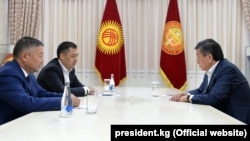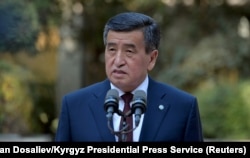Even as Kyrgyzstan’s political future remains uncertain, Kyrgyz President Sooronbai Jeenbekov announced his resignation on the morning of October 15, as demanded by protesters.
In a statement distributed by the presidential press office, the 61-year-old head of state said that he had decided to resign because he did not want to be remembered as a president who caused bloodshed and fired on his own citizens – a reference to the ongoing street protests and brawls that prompted Jeenbekov to introduce a state of emergency and military curfew on October 9.
“I didn’t aim for power,” his statement reads. “For me, the peace of our country, the integrity of our people, the unity of our society are above everything.”
Jeenbekov called on Sadyr Japarov, elected prime minister by parliament on October 14, and “other politicians” to disperse their supporters from the streets peacefully.
Japarov and Jeenbekov are now said to be "holding talks" about the president's resignation, the Kyrgyz news site 24.kg reported.
Warning that Jeenbekov's departure from power could spark a fresh wave of protests, newly elected Parliamentary Speaker Kanat Isaev opposes the president's resignation.
Eyewitnesses report that soldiers and law-enforcement officers are located not far from the presidential residence in Bishkek, the Kyrgyz capital. Army units were brought into the city after Jeenbekov’s declaration of a state of emergency.
Amidst accusations of fraud, raucous street protests broke out in Bishkek on October 5 against the preliminary results of the country’s October 4 parliamentary elections. That vote had seen two pro-government parties, Birimdik (Unity) and Mekenim Kyrgyztsan (My Homeland Kyrgyzstan), together gain roughly 48 percent of the vote, according to preliminary results that were later annulled.
Critics of the vote overran government headquarters, also home to parliament and the president’s office, on the night of October 5-6, prompting the resignation of the then prime minister, Kubatbek Boronov, parliamentary speaker, Dastanbek Dzhumabekov, and a host of other senior officials. Ex-parliamentary deputy Sadyr Japarov, who was serving time for an alleged kidnapping attempt, and ex-President Almazbek Atambaev, imprisoned on corruption charges, were among those released from jail.
One part of the incumbent parliament supported the 51-year-old Japarov, a former advisor to ousted President Kurmanbek Bakiev, becoming the new prime minister, but deputies failed to reach a quorum until October 14.
Along with Japarov, they also selected Kanat Isaev as parliament’s new speaker – a move that will prevent Japarov from claiming the roles of both president and prime minister, noted one Kyrgyz political analyst. Under Kyrgyzstan’s constitution, the parliamentary speaker serves as acting president should the elected president resign.
Parliament’s support for Japarov, who had been in jail since 2017, amounted to “a very clear” example of “the so-called Trump effect,” believes Azim Azimov, a political and strategic communications consultant.
“That is, an absence of alternatives, a vacuum of leadership in our political arena led to a person like Sadyr Japrov being very popular among a broad multitude of our country,” Azimov commented.
Kyrgyz President Jeenbekov, whom Japarov and his protesting supporters had urged to resign by the morning of October 15, earlier had said that he would stay on until new parliamentary elections could be held. Why Jeenbekov changed his mind is not clear. No date for a fresh vote has been announced.
Yet, though recognized as Kyrgyzstan’s legitimate leader by Russia, the United States, European Union, and most other partner states, Jeenbekov suffered from “very low popularity” among voters, which was contributing to a “schism” of power, analyst Azimov noted.
On October 14, Jeenbekov met with Japarov, whose new post the president had confirmed, and Parliamentary Speaker Isaev. Allegedly for health reasons, the new prime minister did not, however, come to a broader discussion that day with the Kyrgyz head of state, ex-President Roza Otunbaeva, ex-Prime Minister Feliks Kulov, and ex-Parliamentary Speaker Omurbek Tekebaev about ways out of Kyrgyzstan’s crisis, RFE/RL’s Kyrgyz Service reported.
In a statement an hour before the intended meeting, Prime Minister Japarov again urged the president to resign. “We will resolve this issue,” he said. “There should be stability, peace, and calm in the country.”
-With additional reporting by RFE/RL’s Kyrgyz Service








